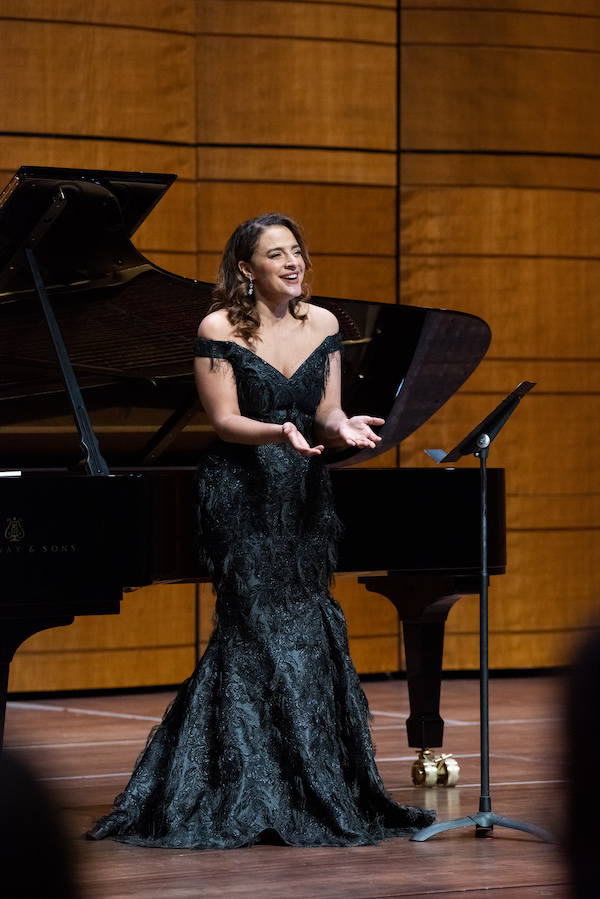Mezzo Chaieb charms in alluring Vocal Arts recital on exotic themes

Rihab Chaieb performed a recital for Vocal Arts DC Thursday night. Photo: Courtney Ruckman
Rihab Chaieb returned to the Kennedy Center Thursday night, after a starring turn in Mozart’s Così fan tutte with Washington National Opera last March. The Canadian mezzo-soprano presented a recital centered on exotic folk songs, presented by Vocal Arts DC in the Terrace Theater. Both Chaieb and her accompanist, Brian Zeger, described the program as a sort of travelog, a “nomadic journey” around the “Mediterranean cradle.”
The first set, Ravel’s Chants populaires, established the theme of folk music, as the composer was setting actual folk tunes collected by the Maison du Lied. Although this was part of a contest rewarding the best adaptations of folk melodies, Ravel’s settings inevitably offer a glimpse of exotic music through a sophisticated European lens. Chaieb deployed her honeyed vocal tone, most luscious at middle and soft dynamics, accompanied with sureness by Zeger.
Florid melismas, recalling folk-style cantillation, punctuated songs throughout the evening, as in Ravel’s opener, the “Chanson espagnole.” At higher registers, as in the “Chanson française,” Chaieb’s voice strained slightly, but she brought considerable dignity to the desolate “Canzone italiana.” In the modally inflected “Chanson hébraïque,” Chaieb made a pleasing timbral distinction between the voice of the questioning father and the responses of the son.
In songs about the African and Asian sides of the Mediterranean, the trope of European fascination with exotic foreign women came into play. In Bizet’s “Adieux de l’hôtesse arabe,” the poem by Victor Hugo is in the voice of a woman in francophone North Africa, trying to lure a handsome foreign traveler to remain with her. Chaieb, who was born in Tunisia, gave the piece an unexpected authenticity, recontextualizing a setting that could be problematic for some listeners.
Ravel’s cycle Shéhérazade has raised similar objections, with tropes in the poems by Tristan Klingsor that now land like unfair Asian and Arabic stereotypes. Chaieb sang the first song, “Asie,” with hypnotizing story-telling, reminiscent of the narrator of The 1001 Nights, evoked by the cycle’s title. The higher reaches, at the two climaxes of this long song, were wildly triumphant, if at the edge of control.
Chaieb was on more solid vocal footing in the two remaining shorter songs, especially the sensuous legato of “La flûte enchantée,” with Zeger giving a fine approximation of Ravel’s sumptuous orchestration. (Egyptian soprano Fatma Said recently recorded this song with the flute part taken by a player of the ney, the end-blown flute known in Persian and Arabic music, another ingenious way to “reorient” cultural perspectives in this piece.)
The only disappointment of the first half was Schumann’s Gedichte der Königin Maria Stuart, in which Chaieb struggled to make the same impact. These songs, set to brutally vivid texts by Mary Stuart, Queen of Scots and mother of James I, are too austere to have much supple charm.
Chaieb and Zeger returned to the Arabic theme with three songs from Six poèmes arabes by Louis Aubert, set to poems by the orientalist writer Franz Toussaint. With her clear, slightly accented French diction (Chaieb grew up in Montreal), the singer rendered each song with gorgeous declamation. The most expansive, “Le vaincu,” came last, with broad sound at the piano from Zeger supporting Chaieb’s full-throated melismatic statement at the end.
Chaieb also drew from the best parts of Osvaldo Golijov’s uneven song cycle Ayre, from 2004. A guest performer, violinist Amirah Ismail, took the harp parts and other material in “Y una madre comió asado,” adding back some of the interest from the chamber orchestration. The second piece involved only the recitation of a poem by Palestinian writer Mahmoud Darwish, read in English by Chaieb and again in Arabic by Ismail.
The program came full circle with the Andalusian folk song “Lamma bada yatathanna,” a melody from Arab Spain in a new setting with European harmony by Rosalie Burrell. Sung in Arabic, the piece pleased with complex irregular metric pattern and evocative cantillation. An operatic selection, the “Habanera” from Bizet’s Carmen, kept the listener in cross-cultural Spain. Chaieb, while perhaps not the vocal ideal for the role, had indisputable dramatic appeal.
With the encore, Chaieb stepped briefly outside her cautious manner of speaking only from notes, introducing with obvious emotion Emel Mathlouthi’s pop song “Kelmti Horra” (My word is free). This simple tune, which became popular with protestors during the Arab Spring uprising in Tunisia, resonated far behind its musical plainness, as Chaieb dedicated it to the struggling women of Iran and Ukraine.
Soprano Emily Pogorelc and pianist Chris Reynolds perform songs by Hugo Wolf, Lili Boulanger, and Joseph Schwantner 2 p.m. February 19, 2023. vocalartsdc.org

